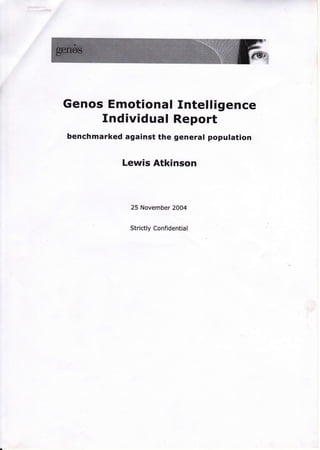Your emotional intelligence was assessed using the Genos Emotional Intelligence instrument. Your total emotional intelligence score was average compared to others. Specifically:
- Your emotional recognition and expression was high, but you could improve managing emotions appropriately.
- Understanding others' emotions was average, offering room for growth in reading workplace dynamics.
- Incorporating emotions into decision-making was average, suiting some roles but not others.
- Managing and fostering emotions was average for yourself and others, with potential for reinforcement.
- Controlling strong emotions was average, suggesting occasional difficulty that better skills could address.
The report recommends focusing on areas scored lower to develop a balanced set of emotional skills.









